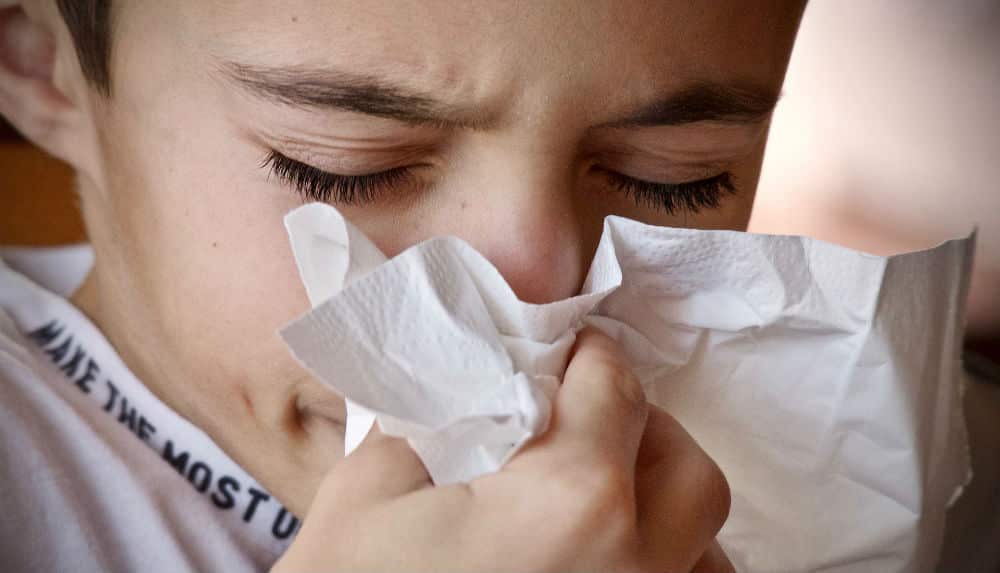Love pets, but hate allergies? For some unlucky folks, cats, dogs, horses, and bunnies all cause the same pet allergy symptoms: itchy, watery eyes, a runny nose or congestion, a rash, hives, and even difficulty breathing. Even allergies are common in dogs and cats, but what is it about some pets that cause allergies to people? Learn more about what causes pet allergies and what you can do to help manage and treat them.
What Causes Pet Allergies?
Pet allergies are caused by proteins called allergens are found in the saliva, urine, and skin flakes or dander of animals and can trigger an allergic reaction or exacerbation of asthma. In some pets, the proteins are concentrated on the fur due to grooming and normal shedding of cells. Hair is then shed into the environment and the number of offending allergens increases in even the most immaculate home. What’s more, pollen and dust tend to “stick” to pets’ fur; allergic reactions may be related to those pesky hitchhikers rather than the pet itself.
Does an allergy to dogs and cats mean a future that holds fish as your only friends? Not necessarily. Skin tests done by your physician may help in diagnosing the true source of the allergy, potentially ruling out the pet as the source of the problem. Owners of cats that are light colored as opposed to black find they suffer from less feline-induced congestion.
Certain breeds such as poodles, bichon frises, and some terrier breeds don’t shed much at all; as such, their home base contains fewer allergens in the air and on surfaces. Smaller dogs tend to produce fewer allergens due to their smaller physical size vs larger breeds. When selecting a dog, consider size and breed if you are allergy-prone. If possible, it’s best to minimize exposure to allergens by keeping pets out of the bedroom. Because we spend so much time sleeping, creating an allergy-free zone reduces the stimulation of our immune system.
Managing & Treating Pet Allergies
Filter the air in your home – Adding a high-efficiency particulate air (HEPA) filter to the bedroom and living areas can reduce most air impurities including pet allergens. Use a vacuum with HEPA filtration bags and consider filters on air ducts. Some pet owners find their allergic symptoms worsen during the cold months when the furnace is running; that could be a sign a deep clean of the HVAC system and filters are in order.
Wash bedding and fabrics – The greatest source of indoor allergens tends to be found in drapes and carpets. If finances permit, remove these particle traps and wash bedding and fabrics regularly. Some owners regularly use a saline nasal rinse to rid air passages of allergens and reduce absorption. Washing your hands after cuddling your pet and before you touch your face is key to reducing instant red-eye and hives.
Brush pet fur regularly – It’s impossible to decrease the amount of dander and saliva our pets produce, but we can take them outside for daily brushing to decrease the hairs shed indoors. Keeping skin healthy and parasite free is important in reducing allergens and general flaking. A parasite preventative, high quality diet, and fatty acid supplements can all help to promote healthy skin.
Bathe your pet weekly – Bathing pets weekly with a mild pet shampoo can also lessen both pollen and mold spores and the salivary proteins and skin cells that accumulate on the fur. Daily, we wipe our pets’ paws and coat down with a damp washcloth to eliminate the particles they track in from outdoors. It’s a hard habit to break, but I also remind my three boys (four including my husband) to remove their shoes before coming inside for the same reason.
Visit the Allergist for treatment – If all else fails, returning to your allergist or immunologist for anti-histamines, medicated nasal sprays, or allergen specific therapy can help reduce your body’s rejection to animal proteins. Over months to years, low doses of allergen can be administered via drop or injection to help desensitize your body to the allergy source.
Sometimes maintenance immunotherapy treatment (allergy shots) is indicated for those with chronic allergies or asthma. Unfortunately, a predisposition to airborne allergies is hereditary. Parents with allergies often have children who manifest allergic disease. For some lucky individuals, tincture of time may be all that is needed to reduce reactivity to their pets as tolerance develops.

